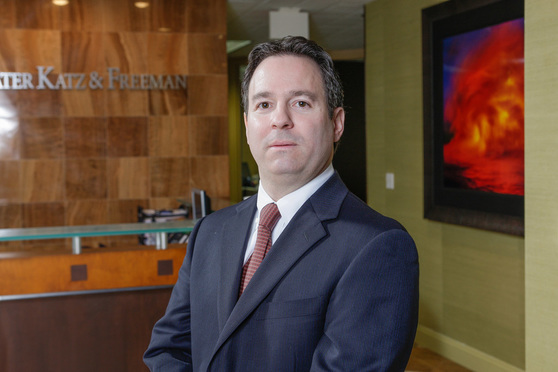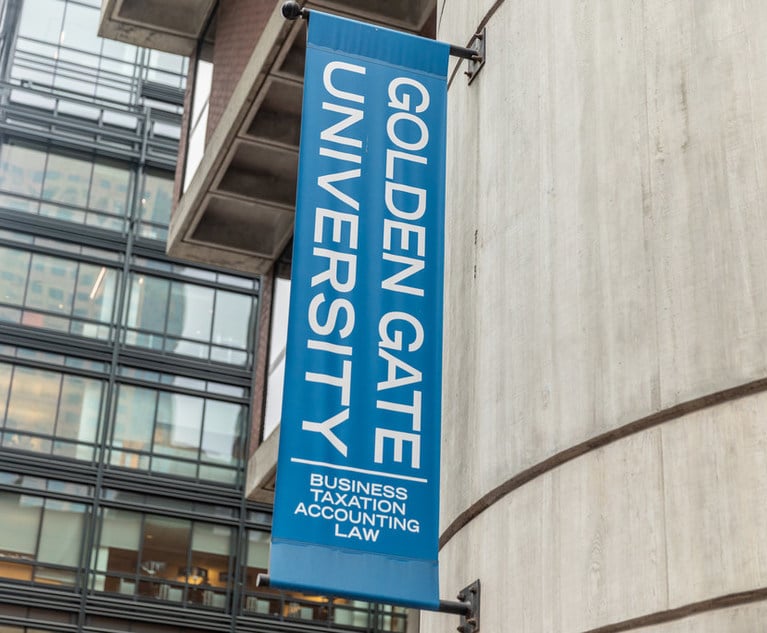Law Firms Objecting to Mesh Fees Accuse Leadership of Self-Dealing, Bill-Padding
Mazie Slater Katz & Freeman this week accused plaintiffs attorney Bryan Aylstock of pressuring the chairman of the fee and compensation committee, Henry Garrard, to boost the amount of fees to his Pensacola, Florida-based firm.
March 28, 2019 at 08:04 PM
7 minute read
 Adam Slater, Mazie Slater Katz & Freeman
Adam Slater, Mazie Slater Katz & Freeman
Law firms objecting to their share of an estimated $550 million in attorney fees in the trans-vaginal mesh litigation have raised new accusations that lawyers tasked with allocating those funds resorted to self-dealing and bill-padding to line their own pockets.
This week's filings are the latest skirmish over fees in the multidistrict litigation over mesh devices—specifically, how much each of the 94 plaintiffs law firms that did work for the “common benefit” should get. On March 12, the fee and compensation committee and Daniel Stack, a retired judge on the Madison County, Illinois, Circuit Court, appointed to review the fee allocation process, issued their final recommendations on how to allocate the fees.
But Adam Slater of Mazie Slater Katz & Freeman, based in Roseland, New Jersey, raised questions in a March 26 objection about the allocation process. He wrote that plaintiffs attorney Bryan Aylstock pressured the chairman of the fee and compensation committee, Henry Garrard, to boost the amount of attorney fees to his Pensacola, Florida-based firm, Aylstock, Witkin, Kreis & Overholtz, which ultimately got $10 million more. According to the objection, Aylstock threatened that his colleague, D. Renée Baggett, a member of the fee and compensation committee, would not sign off on its preliminary written recommendation if Garrard refused to increase his firm's fees.
Mazie Slater partners Adam Slater and David Mazie filed separate declarations insisting that Stack had relayed the information at a Jan. 3 meeting with them.
“Judge Stack stated that he 'was sickened' and 'angered' by this conduct, which he described as Mr. Aylstock pressuring the FCC chairman when he was particularly vulnerable,” Slater wrote in his firm's objection. “Judge Stack explained that he could not recommend the far lower amount he believed Aylstock deserved since he was, as he termed it, 'put in a box' since the agreement with the Aylstock firm included assurance that Judge Stack would not reduce the agreed-upon award.”
The objection also accused Motley Rice of padding its bills in the mesh litigation.
“Similarly, Judge Stack stated that he believed that Motley Rice (like some others in the litigation) had inflated its contributions and had 'padded' its time with thousands of phantom hours,” Slater wrote. Stack told him that Motley Rice did that “in every litigation,” according to the objection.
Slater declined to comment.
Shanin Specter, of Kline & Specter, also filed a March 26 objection that raised similar concerns. Specter is challenging his Philadelphia firm's $3.7 million fee allocation, despite about $16.4 million in lodestar billing. “At bottom,” he wrote, “Mr. Stack's report is worthless.”
In an email, Specter wrote that both filings raised new concerns about the fee allocation process.
“Mazie Slater's and Kline & Specter's filings contain disturbing evidence of fraudulent billing and improper influence of and wrongful conduct by a court appointed officer,” he wrote. “This evidence casts a dark shadow on these proceedings.”
Both Aylstock and Baggett did not respond to a request for comment. Joseph Rice of Motley Rice in Mt. Pleasant, South Carolina, another member of the fee and compensation committee, also did not respond.
Stack, in St. Louis, Missouri, did not respond to a request for comment.
Garrard, of Blasingame, Burch, Garrard & Ashley in Athens, Georgia, denied the account. “I was not pressured by the Aylstock firm nor taken advantage of in any respect. We had discussions just as we did with many firms,” he said in an email.
The fee and compensation committee's response to the objections is due April 9.
On Jan. 30, U.S. District Judge Joseph Goodwin of the Southern District of West Virginia, who is overseeing seven multidistrict litigation proceedings that at one point surpassed 100,000 mesh lawsuits, granted a request from the fee and compensation committee that defendants hold back 5 percent of all settlements and judgments to pay common benefit counsel. Such a holdback, which Kline & Specter had opposed, would grant $366 million in common benefit fees based on the $7.25 billion in settlements so far. The final settlement price tag, though, could be closer to $11 billion, granting about $550 million in fees in the end.
In their objections this week, both Mazie Slater and Kline & Specter insisted that the fee and compensation committee short-changed them, particularly given their work on trials in New Jersey and Pennsylvania state courts. Both objected to the fee amounts granted to the eight law firms on the fee and compensation committee, which got an average award of more than $27 million.
Mazie Slater claimed to be the “catalyst of the overall litigation” and “one of the driving forces and largest risk-takers in the litigation,” filing the first case in the country against Johnson & Johnson's Ethicon Inc. in 2008. Yet Stack's report affirmed the committee's recommendation of $6.02 million. That's not “commensurate with its status as one of the few fundamental leaders of this litigation,” citing the “astronomic” fees that went to members of the fee and compensation committee, Slater wrote.
“Fair evaluation of Mazie Slater's contributions overwhelmingly supports a significantly greater award,” Slater wrote. “The inescapable conclusion is that the most important qualification for common benefit fees was a seat on the FCC, or a close affiliation with an FCC member.”
Kline & Specter, in its objection, cited six verdicts the firm obtained for plaintiffs totaling more than $146 million, all in the Philadelphia Court of Common Pleas.
“Kline & Specter played a critical role in the transvaginal mesh litigation,” Specter wrote. “No firm tried more cases than Kline & Specter or won more verdicts.”
The firm raised questions about the methodologies used to calculate the fee allocations and whether Stack, whose official title is “external review specialist,” was too reliant on the fee and compensation committee to be a true neutral. On Feb. 14, Specter filed a motion to appoint a new special master, citing Stack's “inherent conflict” in having signed the preliminary written recommendation while negotiating with objectors—a move that Garrard called “frivolous” in a response. Specter also asked for more documents that could reveal what firms actually billed.
Goodwin rejected both motions.
“Mr. Stack's methodology, if one exists, was severely flawed,” Specter wrote in his firm's objection this week. “Mr. Stack simply rubberstamped the FCC's recommendations and stated that neither he nor the FCC were required to provide an explanation. This is fundamentally unfair.”
Another firm, Anderson Law Offices in Cleveland, raised similar concerns about Stack in a March 27 objection.
In court papers, Stack defended his actions and the transparency of the fee allocation process. In his recommendation this month, Stack noted that of the 94 firms seeking fees, eight had objected to the fee and compensation committee's final recommendation and, after negotiating with them, only four, including Kline & Specter and Mazie Slater, remained.
This report was updated with comment from Henry Garrard at 11:28 am ET on March 29.
This content has been archived. It is available through our partners, LexisNexis® and Bloomberg Law.
To view this content, please continue to their sites.
Not a Lexis Subscriber?
Subscribe Now
Not a Bloomberg Law Subscriber?
Subscribe Now
NOT FOR REPRINT
© 2025 ALM Global, LLC, All Rights Reserved. Request academic re-use from www.copyright.com. All other uses, submit a request to [email protected]. For more information visit Asset & Logo Licensing.
You Might Like
View All
Defendant Awarded Increased Attorney Fees Six Months After Trial Win Against FTC

'Nothing Is Good for the Consumer Right Now': Experts Weigh Benefits, Drawbacks of Updated Real Estate Commission Policies

Temu Sued by SHEIN for Copyright Infringement, Separate Data Privacy Class Actions Continue in New York
Trending Stories
- 1Avantia Publicly Announces Agentic AI Platform Ava
- 2Shifting Sands: May a Court Properly Order the Sale of the Marital Residence During a Divorce’s Pendency?
- 3Joint Custody Awards in New York – The Current Rule
- 4Paul Hastings, Recruiting From Davis Polk, Continues Finance Practice Build
- 5Chancery: Common Stock Worthless in 'Jacobson v. Akademos' and Transaction Was Entirely Fair
Who Got The Work
J. Brugh Lower of Gibbons has entered an appearance for industrial equipment supplier Devco Corporation in a pending trademark infringement lawsuit. The suit, accusing the defendant of selling knock-off Graco products, was filed Dec. 18 in New Jersey District Court by Rivkin Radler on behalf of Graco Inc. and Graco Minnesota. The case, assigned to U.S. District Judge Zahid N. Quraishi, is 3:24-cv-11294, Graco Inc. et al v. Devco Corporation.
Who Got The Work
Rebecca Maller-Stein and Kent A. Yalowitz of Arnold & Porter Kaye Scholer have entered their appearances for Hanaco Venture Capital and its executives, Lior Prosor and David Frankel, in a pending securities lawsuit. The action, filed on Dec. 24 in New York Southern District Court by Zell, Aron & Co. on behalf of Goldeneye Advisors, accuses the defendants of negligently and fraudulently managing the plaintiff's $1 million investment. The case, assigned to U.S. District Judge Vernon S. Broderick, is 1:24-cv-09918, Goldeneye Advisors, LLC v. Hanaco Venture Capital, Ltd. et al.
Who Got The Work
Attorneys from A&O Shearman has stepped in as defense counsel for Toronto-Dominion Bank and other defendants in a pending securities class action. The suit, filed Dec. 11 in New York Southern District Court by Bleichmar Fonti & Auld, accuses the defendants of concealing the bank's 'pervasive' deficiencies in regards to its compliance with the Bank Secrecy Act and the quality of its anti-money laundering controls. The case, assigned to U.S. District Judge Arun Subramanian, is 1:24-cv-09445, Gonzalez v. The Toronto-Dominion Bank et al.
Who Got The Work
Crown Castle International, a Pennsylvania company providing shared communications infrastructure, has turned to Luke D. Wolf of Gordon Rees Scully Mansukhani to fend off a pending breach-of-contract lawsuit. The court action, filed Nov. 25 in Michigan Eastern District Court by Hooper Hathaway PC on behalf of The Town Residences LLC, accuses Crown Castle of failing to transfer approximately $30,000 in utility payments from T-Mobile in breach of a roof-top lease and assignment agreement. The case, assigned to U.S. District Judge Susan K. Declercq, is 2:24-cv-13131, The Town Residences LLC v. T-Mobile US, Inc. et al.
Who Got The Work
Wilfred P. Coronato and Daniel M. Schwartz of McCarter & English have stepped in as defense counsel to Electrolux Home Products Inc. in a pending product liability lawsuit. The court action, filed Nov. 26 in New York Eastern District Court by Poulos Lopiccolo PC and Nagel Rice LLP on behalf of David Stern, alleges that the defendant's refrigerators’ drawers and shelving repeatedly break and fall apart within months after purchase. The case, assigned to U.S. District Judge Joan M. Azrack, is 2:24-cv-08204, Stern v. Electrolux Home Products, Inc.
Featured Firms
Law Offices of Gary Martin Hays & Associates, P.C.
(470) 294-1674
Law Offices of Mark E. Salomone
(857) 444-6468
Smith & Hassler
(713) 739-1250









